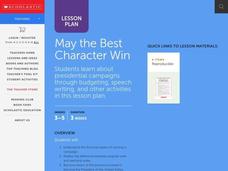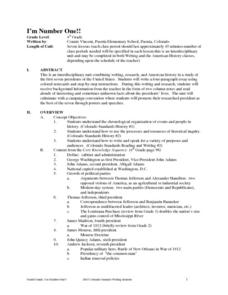Curated OER
Let the Campaign Begin
Students differentiate between positive and negative personal attributes and select a fictional character for nomination who personifies the qualities of a good leader. They use the Internet to learn about the election process and write...
Curated OER
Campaign! The Election Simulation Game
Students simulate the election process with one group acting as politicians and others acting as the constituency with concerns specific to their assigned area of the country. They give speeches, take polls, and elect a leader based on...
Curated OER
Freedom by the Fireside: The Legacy of FDR's "Four Freedoms" Speech
Students read and analyze Franklin Delano Roosevelt's 1941 State of the Union Address. They listen to recordings of speeches by F.D.R., answer discussion questions, and participate in a debate.
Curated OER
May the Best Character Win
Running an election campaign takes money. Class groups must effectively budget money in order to design and purchase sufficient advertising aimed at procuring classmates' votes. After completing an online tutorial, they also write and...
Curated OER
Political Movement: Political Parties
Students explore politics by researching Australian government law. In this political parties lesson, students define the different active parties in Australia and their roles within the country. Students complete a word bank activity...
Curated OER
Donkeys and Elephants and Voters, Oh My!
Learners celebrate party politics. In this American politics lesson, students discover what the 2 main political parties in the country are and discuss their functions. Learners then participate in a classroom simulation that requires...
Curated OER
YOUR OWN CAMPAIGN
Twelfth graders, in groups propose a new law and design a campaign to get people to vote for their law. They have a voter's forum and hold a mock election.
Curated OER
Presidential Campaigning
Eighth graders participate in a simulated presidential campaign by conducting research on the Internet. They define a party platform, run a campaign and write and deliver speeches in teams. Students can then act as the electoral college...
Curated OER
Face the Nation! A Panel Discussion
Sixth graders simulate an election-year debate between opposing political parties. In this persuasive-speech lesson plan, 6th graders will work in teams to prepare for and participate in a debate between opposing parties. The lesson plan...
Curated OER
I'm Number One!
Fourth graders complete a unit of lessons on the first seven presidents of the U.S. They conduct research, write a four-paragraph essay, and create posters and speeches for a simulated campaign convention.
Curated OER
Hafta Do NAFTA?
Students examine the benefits and problems of U.S. participation in the North American Free Trade Agreement. In two groups, students represent the campaign team for a presidential candidate, one for and one against NAFTA, and research...
Curated OER
Voting
Students participate in a role play where they run for office and address the issues they want to fix. In this voting lesson plan, students then vote on which candidate they want to run their classroom.
Curated OER
Who Was Marc Antony?
Young scholars explore the relationship between Marc Antony and Cleopatra. In this World History lesson, students research Marc Antony, Julius Caesar and Cleopatra, then answer specific questions about how they are all...
Curated OER
The Voting Game
Students examine and discuss the Canadian electoral process. They conduct a simulation of the electoral process, with students running as candidates, holding a convention, campaigning, and voting for Prime Minister of the Day.















